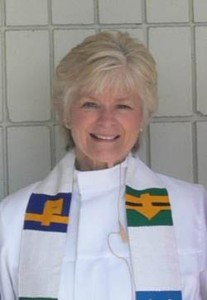Megan Herrold is a pastoral intern at Resurrection Covenant Church in Chicago. She is currently pursuing an MA in Christian Formation at North Park Theological Seminary, and is the seminary’s student representative on the ECC Commission on Biblical Gender Equality.
 Lately I’ve been embracing the art of imperfection.
Lately I’ve been embracing the art of imperfection.
It started when I began reading Daring Greatly by Brené Brown. She studies and writes about shame and vulnerability. In her research, Brown noticed that women commonly experience shame when they make mistakes or are less than perfect, because we have an entrenched belief that we’re supposed to be perfect in all that we say and do.
Consequently, if we make a mistake, we feel it not as doing something wrong but being wrong—a mistake suggests there is something inherently ‘wrong’ about us.
(I want to mention briefly that in what I’ve read, Brown doesn’t mention anything about the cultural backgrounds of the people in her research, so her conclusions that I discuss here may apply more to white American women than to women of other cultures.)
I really identified with this desire to be perfect all the time. It’s actually somewhat crippling when it comes to taking leadership roles: I find myself in this loop of not feeling comfortable or right for a new role if I can’t do it perfectly, but not being able to do the new thing perfectly until I’ve tried a few times. It’s similar to the Imposter Syndrome Jo Ann Deasy wrote about last month.
In the last year or so, before I even read this book, I had found myself referring to my “perfectionistic tendencies” in conversations with friends, in counseling, and with my internship advisor. But when I talked about it before, I called it part of my personality. Brown’s research suggests a different source for this perfectionism. If a phenomenon is this pervasive among a socially delineated and identifiable group, it’s hard for me to believe that it isn’t at least somewhat socially constructed.
In other words, Brown’s observations suggest to me that I’m a perfectionist because that’s what society wants me to be, or tells me I should be.
Fortunately—or perhaps unfortunately, I’m not really sure—I have a bit of a contrary streak. If someone tells me who I’m supposed to be or what I’m expected to do, I automatically don’t want to be or do it. It’s a good part of why I never saw the movie Avatar. Or Les Misérables. They were both movies that “everyone” was seeing and “everyone” just had to see. So of course, I didn’t.
I heard a speaker at church a few years ago (not the pastor, someone else on the teaching team) make a joke about how he doesn’t really know anything about women; the only things he knows are shoes, purses, and chocolate.
It made me angry to hear someone try to reduce me—and more than half of the rest of the congregation—to those three things, even as a joke. It also made me proud that two of them didn’t apply at all to me. I’m not super particular about purses or shoes. Most of what I own are hand-me-downs and my mom and her sisters have more than once said I should replace what I have because they’re so worn out.
I do like chocolate, but after that joke, I didn’t eat any for months. Just the idea of eating any made me slightly nauseous. I didn’t want to be this person someone else expected me to be.
This time, my contrariness has decided that I’m not going to be perfect anymore. (I laugh at how I try to write that as if I ever was perfect to begin with.) Instead I’ve started embracing the times that I make mistakes (minor ones) as a sign that I’m letting go of other people’s expectations of me.
And it’s just…so…freeing! I can’t tell you what it’s like to have this pressure off. It’s like I’ve lost a huge weight off my shoulders. Or like losing 20 pounds, but not even caring because who cares what I look like anyway? Everything from “Is my hair still perfect at the end of the work day?” to “Did I use the most theologically correct preposition when I was praying during communion?”
In addition, when I decided to feel happy about minor mistakes, I found I had a lot more to be happy about than when I was striving for perfectionism.
Obviously I don’t go out looking for mistakes I can make—why bother when there are plenty for me to make without going to all the effort of actually trying? What a waste of time. And I don’t want to do a bad job in new leadership roles, but it’s helpful to remember that maybe God can use me for good in the midst of my mistakes. I don’t want the fear of imperfection to keep me from the joy of God working through me like that.
So I’m happy to say that I plan to keep embracing my unintentional mistakes for awhile.









Discovering What You Didn’t Know Was Missing
Filed under: Book & Commentary, Testimonies and Stories
Nilwona Nowlin currently serves as the Administrative Specialist for Governance for the ECC and is a member of the Christian Community Development Association and the Redbud Writers Guild. In her “spare time,” she teaches workshops about living successfully as an introvert. Nilwona is a member of the Kingdom Covenant Church (Chicago) launch team and randomly blogs about random things at thedreamerspeaks.
I’ve been reading leadership books for years, but it was only recently that I realized something: none of the books I’d been reading were written by women. If I broadened my definition of a “leadership book,” it might allow for the inclusion of a small handful of female authors. (And I haven’t even bothered to raise the issue of ethnicity.) I am naturally quite observant, but sometimes – like in this case – it takes me a while to notice a pattern. In other cases, I miss the pattern altogether.
Last week, I participated in the ECC Sankofa Journey, and experienced quite an eye-opening surprise: both of our drivers were black women. It wasn’t until I saw them that I realized I had never seen a female coach bus driver, let alone one who was a black female. (To add to our amazement, they were also sisters.) In all my experiences riding on a coach bus, I had never stopped to wonder whether or not there were women in this business. In my moment of giddy elation, I said to a friend, “You don’t even realize what’s not there until you see it!” As I reflected on this moment, it helped me understand why I was so excited about a book I recently read.
There are lots of articles, books and memes on leadership that suggest that individuals should regularly be in relationships as both a mentor and a mentee. Because I sometimes fall into the trap of believing that the source of my paycheck defines who I am, I often struggle with whether or not I have anything of value to share with a mentee. We often see mentoring as a “secular” thing, but Robinson describes it as an opportunity to “partner with God.” This reframing of mentoring as discipleship helps me rethink things. While mentoring seems like a good thing to do, discipleship is a non-negotiable for Christians. In addition, Robinson focuses on mentoring in a communal setting vs. the typical 1-on-1 style. (I do think that the group model has become more popular in recent years.)
Since I’ve only recently experienced Robinson’s book, I don’t have any testimonials about how this method has worked for me. However, I’m excited about the opportunity to put into practice what I’ve learned. I’m particularly excited about the fact that I don’t have to do a lot of contextualizing/translating, because Robinson has taken into consideration how issues of diversity (age, gender, ethnicity, culture, etc.) impact discipleship/mentoring efforts. If you’d like to know more about Robinson or Mentoring for Life, check out her website.
Report This Post